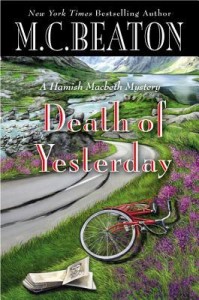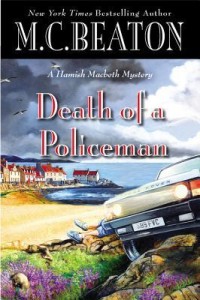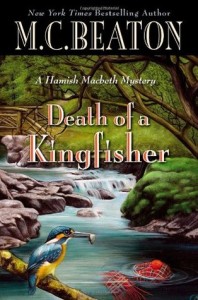 Format read: ebook provided by the publisher via NetGalley
Format read: ebook provided by the publisher via NetGalleyFormats available: hardcover, ebook, audiobook
Genre: mystery
Series: Hamish Macbeth #31
Length: 272 pages
Publisher: Grand Central Publishing
Date Released: February 3, 2015
Purchasing Info: Author’s Website, Publisher’s Website, Goodreads, Amazon, Barnes & Noble, Kobo, Book Depository
Sergeant Hamish Macbeth is alarmed to receive a report from a woman in the small village of Cronish in the Scottish Highlands. She has been brutally attacked and the criminal is on the loose. But upon further investigation, Hamish discovers that she was lying about the crime. So when the same woman calls him back about an intruder, he simply marvels at her compulsion to lie. This time, though, she is telling the truth. Her body is found in her home and Hamish must sort through all of her lies to solve the crime.
My Review:
The Hamish Macbeth series is still fun in small doses, but this one could have doubled as an episode of House, because everybody lies.
The story begins with a woman who claims to have been brutally attacked and raped, but there’s no evidence. She also doesn’t want Hamish to call in the local doctor, and we soon find out why – the woman not only has not been raped, she’s a virgin. There’s no evidence of any crime whatsoever, but there is a lot of evidence that the lady is a pathological liar. Because the call is in a relatively remote village, Hamish is not pleased by this waste of police time, especially when it is his.
While the desire is normally to believe the victim, in this case it is simply not possible. The doctor provides Hamish with a long list of lies that the supposed victim has told. She isn’t making stuff up to protect herself, she simply can’t stop herself from lying. She has mythomania.
So when she calls Hamish again to report a murder, he understandably doesn’t believe her. In this case, we have a woman who cried wolf. And just like the story of the boy who cried wolf, this woman is telling the truth, just this once. And she dies for it.
 As usual, nothing about this crime is exactly as it appears. Hamish starts out investigating a lonely death and finds himself poking into a religious cult that is fronting for both a long con and a drug running gang. He eventually gets to the right perpetrators, and most importantly finds the money, but it takes more than the usual number of red herrings, and proceeds nicely through the Macbeth series standard formula (see Wednesday’s review of Death of Yesterday for a description of that formula.)
As usual, nothing about this crime is exactly as it appears. Hamish starts out investigating a lonely death and finds himself poking into a religious cult that is fronting for both a long con and a drug running gang. He eventually gets to the right perpetrators, and most importantly finds the money, but it takes more than the usual number of red herrings, and proceeds nicely through the Macbeth series standard formula (see Wednesday’s review of Death of Yesterday for a description of that formula.)
While the journey in this series is always fun, the humor and in jokes are more fun if you’ve read some previous books in the series. But not too many.
 Escape Rating C+: I read three of the Hamish Macbeth books in a row, after not having read one for several years. In addition to Death of Yesterday (see review) I also read Death of a Policeman (I got it from the library and did not review it).
Escape Rating C+: I read three of the Hamish Macbeth books in a row, after not having read one for several years. In addition to Death of Yesterday (see review) I also read Death of a Policeman (I got it from the library and did not review it).
I certainly enjoyed reading this series again. Hamish is an interesting character, and the townspeople of Lochdubh are by turns eccentric and charming, sometimes both at the same time.
Hamish is unusual in that he is a relatively young man who has come back to an area where the young people are mostly leaving. A fact that does not help his love life, which he constantly bemoans. He would like to settle down and get married, but his options in Lochdubh are simply limited.
At the same time, he is an unambitious man in an ambitious world. He doesn’t want a promotion, because any rank above Sergeant would take him out of Lochdubh and into the city of Strathsbane, which is a cesspit in general and Hamish just doesn’t want to live in a city. He likes his small cottage with his dog and his cat and the various livestock he keeps. He loves the pace of small-town life, and feels duty-bound to use his office to help the people of the county.
But he constantly bemoans his lack of romantic options, and continually reflects back on the two women he has been unsuccessfully engaged to. Unfortunately for him, they both return to his life just often enough to keep him from totally moving on. Thirty one books into the series, readers want some resolution to the poor man’s dilemma.
And speaking of Hamish’s dilemmas, he is an unconventional cop in a force that needs conformity and convention. Because he does the job, and does it well, he is able to hang onto it. But he drives his superiors bonkers. He’s not respectful, he doesn’t care about the status quo, and he doesn’t want a promotion or recognittion, so they don’t understand him or trust him.
Speaking of his superiors, one of the things that started to get to me was the Blair/Daviot dynamic. DCI Blair is Hamish’s immediate superior. The problem is that Blair is inferior in every way, and resents Hamish for showing him up at every turn. Human nature says that because Hamish lets Blair take the credit, Blair feels even more inferior and more angry about it.
The one thing Blair is good at is being properly deferential (read that as subservient) to Superintendent Daviot, his boss. Daviot knows that Blair is not merely useless, but an active detriment to solving crimes, but he keeps on defending him and letting him remain in his job in spite of his obstruction of justice and tampering with evidence. And his on the job drinking.
Daviot is equally culpable, for refusing to allow any investigations into his own friends and fellow club members, even when the evidence clearly points in their direction. The symbiotic and toxic relationship between Blair and Daviot has been going on a bit too long. I want someone to pay, and someone in a higher position to recognize that one of them (Blair) has to retire (or be hospitalized). Their behavior is negligent if not criminal, and it’s frustrating to see it continue in book after book without being addressed.
So three Hamish Macbeths in a row is probably my limit for a while. I hope the author introduces some changes to the formula in future books.

